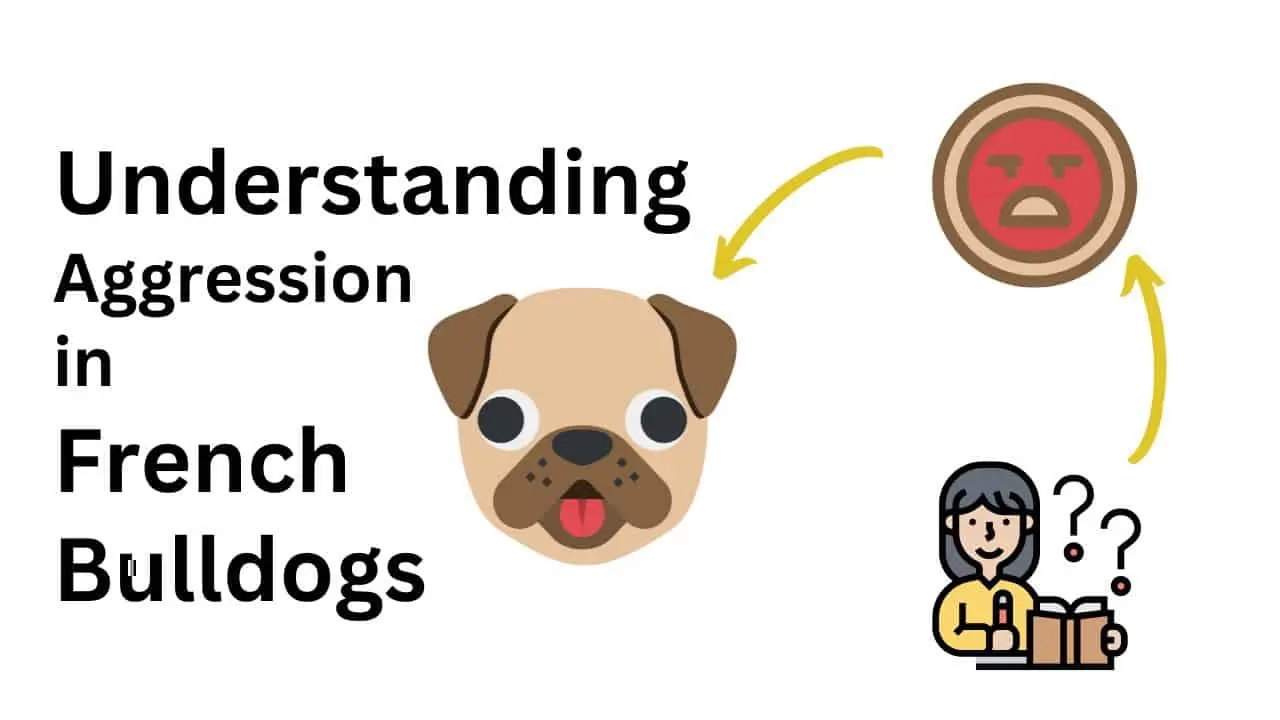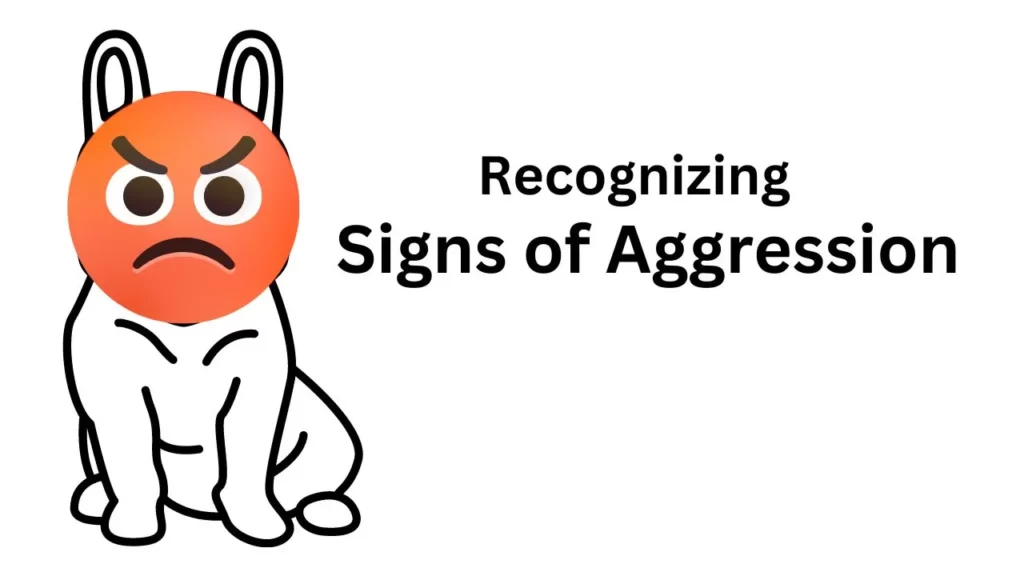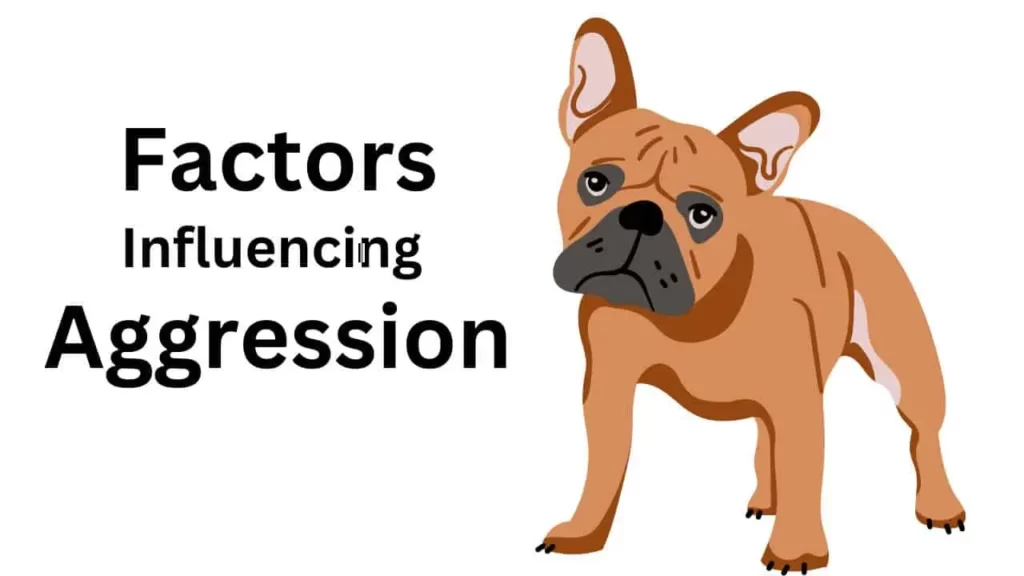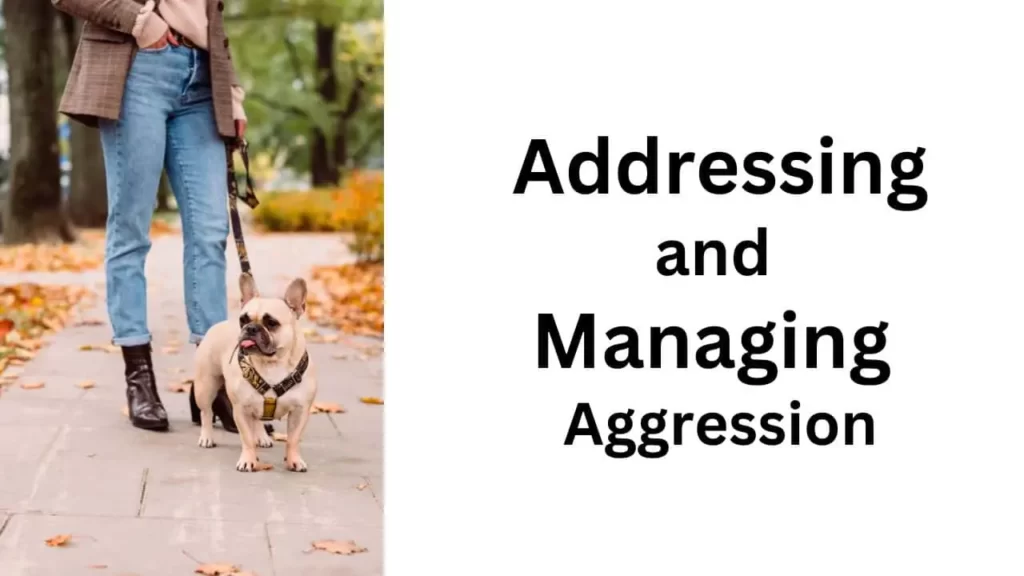Why is My French Bulldog So Aggressive? Complete Guide
Introduction
Why is My French Bulldog So Aggressive? Understanding the Causes and Finding Solutions.
French Bulldogs have cherished companions known for their delightful personalities and playful nature. However, some owners may face the challenge of dealing with aggression in their French Bulldogs. In this comprehensive guide, we will explore the various factors contributing to aggression in French Bulldogs and provide proactive strategies to address and manage it effectively.
By understanding why your French Bulldog may display aggressive behavior and implementing positive training methods, you can create a harmonious and loving relationship with your furry friend.
The Nature of Aggressive French Bulldogs
French Bulldogs: Affectionate Companions with Unique Personalities
The lovable canine friends known as “Frenchies,” or French Bulldogs, have become incredibly well-known all over the world. French Bulldogs have won the hearts of dog lovers worldwide thanks to their unusual bat-like ears, expressive eyes, and endearing personality. Knowing the characteristics of this dog crucial to understanding the causes of their behavior, particularly hostility.
This breed is renowned for its kind and devoted personality. They enjoy human company and frequently develop close relationships with their owners. These dogs are well-known for being friendly, making them excellent family pets and suited for various dwellings, including apartments.
Despite their small size, they possess a spirited and confident personality. They give off the impression of being active and curious, frequently amusing their owner with their clownish behaviors. French Bulldogs love to explore their surroundings and have a sense of adventure.
It’s crucial to remember that every French Bulldog has its personality and disposition. While most Frenchies are amiable and laid-back, others could show aggressive behaviors. Frenchie dog owner must know their innate qualities and deal with any potential behavioral problems. This piece of content covers the crucial question i.e., Why is My French Bulldog So Aggressive?

Understanding them and their typical temperament can help us better handle and manage any potential aggressiveness problems. They may grow and mature into well-rounded, balanced companions with the right training, socialization, and surroundings.
Keep in mind that each Frenchie is unique, and their personality might change. It’s critical to approach their training and behavior control with persistence, positivity, and patience. Your dog can develop a loving, harmonious relationship with you that will ensure their happiness and well-being with the correct training and understanding.
Do you know about the issues associated with your French Bulldog’s nature if not then you may want to check out the following piece of content where we have talked about the 7 surprising French Bulldog Behavior Problems YOU Didn’t Know About.
Understanding Aggression in French Bulldogs

Types of Aggression in French Bulldogs: Unraveling the Puzzle
French Pups, known for their affectionate nature, can occasionally display aggressive behavior. Understanding the different types of anger is crucial in unraveling the complex puzzle of aggressiveness in these dogs.
To know more about your French Dog breed nature when they are around other pets, especially Cats then we have a detailed guide that you must read to understand the truth about the question that people ask Are French Bulldogs Good with Cats? This will add up to the understanding Why is My French Bulldog So Aggressive?
Fear-Aggression
Identifying and Managing Anxiety-Driven Behavior
Fear aggression results from a feeling of dread or a sense of impending danger. They may respond defensively when confronted with an intimidating or strange circumstance. Growling, barking, lunging, or even snapping are examples of signs of both fear and hostility. To make your dog feel more safe and confident, it’s critical to identify and deal with the underlying fear triggers.
Resource Guarding Aggression
Nurturing a Healthy Relationship with Possessions
When a French Bulldog acts aggressively to secure prized things, such as food, toys, or even resting places, this is known as resource-guarding aggression. When a person approaches these resources, this behavior may take the form of growling, snarling, or even biting. Resource guarding can be addressed and a healthier relationship with belongings can be encouraged by using the right training methods, such as desensitization exercises and positive reinforcement.
Territorial Aggression
Balancing Security and Social Harmony
When a French Bulldog defends its perceived area, such as the house or yard, territorial aggression results. When a threat to their territory is perceived, they may act aggressively by barking, growling, or lunging. Territorial dog aggression can be controlled and a peaceful living environment can be created by establishing a strong foundation of training, making sure that children are properly socialized, and teaching appropriate boundary-setting.
Dog-Dog Aggression
Promoting Positive Interactions and Social Skills
You may also ask Why is My French Bulldog So Aggressive to other dogs? Aggressive behavior towards other canines is referred to as dog-dog aggressiveness. Like any breed, Frenchie can exhibit dog-dog aggression, which can result in uncomfortable interactions or even fights. Positive reward training, controlled encounters, and early social development can all assist develop positive social skills and lower the risk of dog-dog conflict.
Human-Aggression
Fostering Trust and Confidence
Although it happens infrequently, some Frenchie can become aggressive towards people. Anger can result from several things, including fear, lack of proper socialization, or unpleasant past experiences. It’s crucial to deal with human hostility with patience, comprehension, and constructive training techniques. Working with a qualified dog behaviorist can offer helpful advice on how to control and alter this behavior.
Knowing the many forms of aggression dog owners can pinpoint the root reasons and develop tailored behavior control plans. By identifying the particular form of aggression your dog exhibits, you may use targeted training methods and provide a supportive atmosphere to handle the problem successfully.
Recognizing Signs of Aggression

Decoding Key Indicators of Anger
For early intervention and successful temperament control, it is critical to recognize the warning signals of anger. Understanding and recognizing these signs can help you deal with the rage before it worsens and make your dog’s environment secure and peaceful.
It is important to comprehend the 3 significant attributes of Body Language Cues, Aggressive Postures and Behaviors, and Contextual Triggers to understand Why is My French Bulldog So Aggressive?
- Body Language Cues:
- Stiff posture: Rage can be indicated by a rigid body position, elevated hackles, and a stiff facial expression.
- Direct staring: Prolonged, intense eye contact that is frequently accompanied by a fixed gaze may be an aggressive warning sign.
- Growling or snarling: These French dogs frequently display anger by making audible vocalizations, such as low growls or snarls.
- Showing teeth: Bare teeth, frequently paired with pursed lips, signify a greater degree of fury or discomfort.
- Raised tail and erect ears: These physical cues may indicate attentiveness and a propensity to act aggressively.
- Aggressive Postures and Behaviors:
- Lunging or charging: A sudden forward movement toward a person, another animal, or an object might signify hostile intent.
- Biting or snapping: Even without inflicting harm, biting or snapping acts are blatant displays of assertiveness.
- Overbearing dominant behavior: Implied by attempts to establish dominance by actions like mounting, blocking, or body-checking.
- Unwillingness to back down: When hostility persists despite efforts to de-escalate or retreat, it may be indicative of a more severe form of enmity.
- Contextual Triggers:
- Resource guarding: Growling or snapping aggression in the presence of food, toys, or other things may be a sign of resource guarding behavior.
- Protective behavior: When they feel a threat to their family or territory, they will become aggressive.
- Fearful responses: Frequently displayed as defensive behavior when individuals are exposed to new circumstances or stimuli.
It’s important to note that these dog species may exhibit other forms of behavior that can be misinterpreted as aggression. For instance, some Frenchies may playfully nip or engage in vocal play-growling during playtime. However, distinguishing between playful behavior and true aggression requires careful observation and understanding of their body language and context.
If you notice any signs of aggression in your French Bulldog, it’s crucial to consult with a professional dog behaviorist or trainer. They can provide further guidance in understanding the underlying causes and help develop a customized behavior modification plan tailored to your French Bulldog’s specific needs.
It’s important to be aware of these signs and take action to address them. By doing this, you can make your home a secure and caring place for your furry friend that supports their emotional health and builds a positive relationship.
Do you know that there is this rare French Bulldogs breed known as Blue Merle French Bulldogs? If you don’t know or you have some knowledge about this unique family of Frenchies then this piece of content must be helpful for YOU. Click here to read.
Factors Influencing Aggression in French Bulldogs

- Genetic Predisposition: Understanding Breed Traits and Tendencies
Like many dog breeds, French Bulldogs have particular hereditary inclinations and features that can affect how they act, including aggression. Although they are often thought of as friendly and welcoming dogs, it’s crucial to realize that some individuals may inherit characteristics that make them more likely to become aggressive.
Both the dog’s genetic background and breeding practices have the potential to affect these qualities.
- Socialization and Training: Shaping Behavior and Emotional Well-being
Early and positive exposure to a variety of people, animals, environments, and stimuli helps them develop confidence, adaptability, and suitable social skills. Proper interaction should include positive interactions with people of different ages, other animals, and exposure to various environments and situations. Obedience training and consistency training are crucial in shaping his actions and reducing the likelihood of rage.
- Fear, Anxiety, and Past Experiences: Unraveling the Emotional Factors
These dog breeds’ aggressive tendencies can be influenced by fear, anxiety, and previous experiences. A dog’s emotional health and risk of displaying violent actions might be negatively impacted by traumatic experiences, a lack of early interaction, or a history of maltreatment.
Frenchie that have not had enough exposure to a variety of people, pets, and places could become hostile out of fear in new or stressful circumstances. It is essential for creating effective habit modification strategies to recognize and address the emotional causes of violence.
- Health and Medical Conditions: Addressing Underlying Issues
Anger can be exacerbated by specific medical disorders or diseases. Their actions may be impacted by pain, discomfort, hormonal imbalances, or neurological problems, which may result in more aggressive behavior.
It’s crucial to make sure your French Bulldog has regular veterinary checkups, which should include in-depth examinations and the proper diagnostic testing, to find out if any underlying medical conditions might be causing aggression. The way they act may be positively affected by the treatment or management of these diseases.
- External Triggers and Environment: Influences on Behavior
The degree of aggressiveness may also be influenced by environmental factors and outside causes. Aggression can result from several things, including inadequate interaction with others, difficult living circumstances, inconsistent or severe training techniques, or exposure to harmful stimuli.
For your Frenchie to feel safe, comfortable, and loved, a stable and caring environment is essential. A pleasant environment for your dog may be created by using consistent training techniques, positive reinforcement, and avoiding circumstances that might cause hostility.
It is possible for individuals to actively manage and avoid destructive habits by having a thorough understanding of the numerous elements that might affect rage in them. You may assist the dog in growing into a well-mannered and balanced companion by addressing these issues and putting in place the proper training, societal interaction, and environmental modifications.
It’s crucial to keep in mind that every dog is different, and enlisting the help of a qualified dog behaviorist or trainer may offer insightful advice and support in successfully regulating aggressiveness.
Addressing and Managing Aggression

Positive Reinforcement Training Techniques: Shaping Desirable Behaviors
Techniques for training positive reinforcement are quite efficient at reducing aggressiveness. Instead of penalizing undesirable attitudes, this strategy emphasizes rewarding favorable behaviors.
You can influence your French Bulldog’s reactions and promote constructive relationships by rewarding them for restrained non-aggressive acts. Use rewards, compliments, and play as reinforcers of actions that are beneficial. When they show symptoms of rage, divert their focus to a proper task or order. Positive practices must be reinforced consistently and often to deter aggressive tendencies.
Seeking Professional Guidance: Certified Experts as Your Allies
The management of French doggy aggressiveness can be difficult, thus consulting a specialist is strongly advised. Certified dog behaviorists or trainers that focus on antagonism problems may offer insightful advice and create personalized behavior modification plans depending on the needs of your dog.
To ensure long-term success, they will evaluate the factors that lead to aggressiveness and its underlying causes, assist you in putting training methods into practice, and track your progress. They’ll provide you with the support you need while guiding you through the difficulties of dealing with aggressiveness thanks to their knowledge and experience.
Behavior Modification Techniques: Changing Patterns and Responses
Behavior modification techniques aim to change the underlying patterns and responses that trigger Frenchie’s aggression. Some effective techniques include:
- Desensitization: Gradually expose your puppy to the trigger that elicits anger in a controlled and positive manner. Start with a low-intensity version of the trigger and gradually increase exposure while rewarding calm behavior. This helps them build tolerance and reduce their reactive response.
- Counterconditioning: Pairing the presence of the trigger with something positive, such as treats or play, to create a new positive association and change their emotional response. For example, if your French puppy displays rage toward another dog, you can reward them with treats or praise when they remain calm and non-aggressive in the presence of other dogs.
- Management and Environmental Control: Implementing measures to prevent or minimize exposure to triggers that provoke aggressive action. This may include using baby gates, and crates, or managing the environment to reduce stress and potential conflicts. Gradually reintroduce triggers in a controlled manner once your dog has shown progress in their behavior modification.
Consistency and Patience: Keys to Success
Consistency and Patience are required to understand why is my French Bulldog so aggressive. It’s important to remain calm and composed during training sessions, avoiding any aggressive or punitive actions that may escalate the situation. Consistency in applying training techniques and providing clear expectations helps the dog understand what is expected of them.
Setbacks and slow progress are also possible. Celebrate small victories along the way and be patient with the process. Consistency, patience, and a positive outlook will go a long way in managing and modifying disruptive behavior.
By employing positive reinforcement training techniques, seeking professional guidance, and implementing behavior modification techniques, you can effectively address and manage your Frenchie’s rage. Remember to tailor your approach to your dog’s specific needs and always prioritize their well-being. With time, patience, and dedication, you can help your French puppy overcome his aggressive nature and foster a harmonious and loving bond.
Preventing Aggression in French Bulldogs
Preventing anger is essential for a well-balanced and happy dog. By taking proactive steps, you can create a safe and nurturing environment that minimizes the risk of violent behavior. Here are some key strategies to prevent this violent nature:
- Early Socialization: Introduce him to various people, animals, and environments from a young age. This helps them develop confidence, learn appropriate social skills, and build positive associations.
- Positive Reinforcement Training: Use positive reinforcement techniques to reward desirable behaviors and discourage unwanted ones. Reward your Frenchie with treats, praise, and playtime when they exhibit calm and appropriate behavior.
- Consistent Routine: Establish a consistent daily routine for your Frenchie. Dogs thrive on structure and knowing what to expect, which helps reduce stress and anxiety.
- Supervised Interactions: Ensure that all interactions with other dogs or animals are supervised and positive. Proper socialization and positive experiences with different animals can help prevent violent actions.
- Enriching Environment: Provide mental and physical stimulation through interactive toys, puzzle games, and regular exercise. A stimulated and engaged Frenchie is less likely to display aggressive habits out of boredom or frustration.
- Positive Role Modeling: Be a calm and assertive leader for your dog. Your behavior and attitude can influence their reactions. Model patience, assertiveness, and problem-solving skills.
- Regular Veterinary Care: Schedule regular check-ups with your veterinarian to address any underlying health issues that may contribute to rage. Physical discomfort or hormonal imbalances can impact Frenchie’s behavior.
- Continued Training and Social Interaction: Maintain ongoing training and social interactions throughout his life. This helps reinforce positive behavior, maintain social skills, and prevent the development of anger.
By implementing these strategies consistently, you can greatly reduce the likelihood of anger in your Frenchie and promote a well-behaved and balanced pet. Remember to be patient, and understanding, and provide a loving environment for your furry companion. These practices will greatly improve your dog’s attitude and will crack your query about Why is My French Bulldog So Aggressive.
Conclusion
Why is My French Bulldog So Aggressive? In conclusion, by implementing early socialization, positive reinforcement training, maintaining a consistent routine, supervising interactions, providing an enriching environment, being a positive role model, prioritizing regular veterinary care, socializing, and continuing training, you can prevent anger and creating a safe and loving environment for your pet.
Remember to be patient, and consistent, and seek professional guidance when needed. With the right preventive measures, you can raise a non-aggressive and well-adjusted Frenchie that will bring joy and companionship to your life.
FAQs about My French Bulldog So Aggressive
Why is My French Bulldog So Aggressive?
Anger in Frenchie can be influenced by various factors, such as fear, territorial instincts, lack of social interactions, or underlying health issues. It’s important to identify the underlying cause and seek professional guidance for appropriate behavior modification.
How can I prevent aggressiveness in my French Bulldog?
Prevention involves early socialization, positive reinforcement training, maintaining a consistent routine, providing mental and physical stimulation, and being a calm and assertive leader. It’s essential to create a safe and nurturing environment that promotes positive behavior.
Are French Bulldogs naturally aggressive?
No, French Bulldogs are not naturally hostile animals. However, Individual personality types can differ. A caring environment, appropriate interaction with others, and training can all assist to avoid and lessen violent tendencies.
Can aggression in French Bulldogs be trained out?
With consistent training, behavior modification techniques, and professional guidance, anger in this breed can be managed and improved. However, complete elimination of anger may not always be possible, and ongoing management may be necessary.
What should I do if my French Bulldog displays aggressive behavior?
If your French Pup exhibits anger in nature, it’s crucial to ensure your safety and the safety of others. Consult with a professional dog behaviorist or trainer to assess the situation, identify triggers, and develop a customized behavior modification plan tailored to your dog’s specific needs.
Are you looking for any specific information about your Pet or Dog Breed? Get in Touch.







